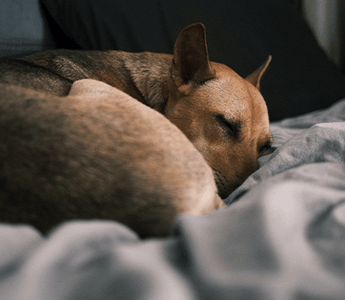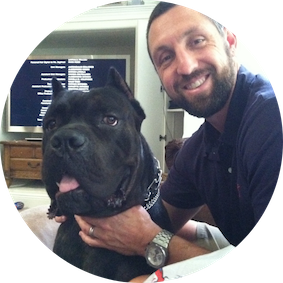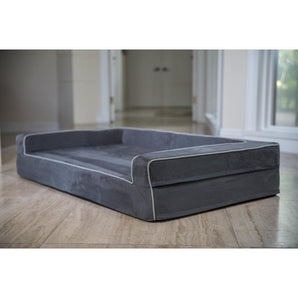Everything you Need to Know About Dog Sleep Disorders
Dogs can suffer from sleep disorders, too, and lack of sleep can lead to severe health problems. Learn what kinds of sleep disorders can affect dogs. Sleep disorders aren't just a problem for people, they can affect your dog as well. Dogs sleep a lot, but can adapt their sleeping patterns, so they should be able to sleep through the night.
But that may not always be what, in fact, happens. If your furry friend is waking up and whining during the night, or seems to be extra tired during the daytime, or seems to fall asleep suddenly, they may have trouble sleeping, or perhaps a sleep disorder. Or…you may consider that its bed or sleeping arrangement are not comfortable. Our dogs many times keep us from sleeping deeply, and cause to awaken often. But we can also have the same effect on our dogs!
Some sleep disorders seem to be related to genetics and family history, and some breeds are more likely to suffer from sleep disorders. English Bulldogs, Dachshunds, Poodles, Doberman Pinschers, Beagles, Labrador Retrievers all have an increased risk of sleep disorders.
WHY AREN'T THEY GETTING ENOUGH SLEEP?
Sleep disorders usually keep your dog from getting enough sleep during the night, or from getting enough Rapid-Eye Movement (REM) sleep. REM sleep is the period during which humans dream, and is the most important phase of sleep to recover and rest properly. Proper sleep is also very important for our immune system. REM stages get longer throughout the night, so if your dog wakes up for any reason, they may interrupt the cycles and not get enough REM sleep.
4 MOST COMMON SLEEP DISORDERS FOR DOGS:
- Insomnia
Insomnia means trouble sleeping, either at the start of the night, or waking up during the night and being unable to fall back asleep. Insomnia is often a sign of some other problem, like an injury, anxiety, or illness, but is also associated with old age in dogs. (one reason a comfortable, therapeutic bed is absolutely necessary for an elderly dog…better yet, keep arthritis at bay by starting with a good therapeutic bed during all the years of a dog’s lfe!)
As dogs get older, they are more likely to have a condition which causes discomfort, such as joint or digestion problems. This makes it harder for them to get comfortable and sleep throughout the night. Bladder problems may also wake your senior dog, and they may need to go out during the night, even if well-trained.
- Narcolepsy
Narcolepsy is a rare but note-worthy sleep disorder which affects dogs. It can cause a disruption in the dog's sleeping and REM cycle which may lead to extreme sleepiness during the day.
Narcolepsy symptoms can include sleep attacks or “cataplexy” which is sudden muscle weakness and paralysis while remaining awake. These attacks (which last a few seconds to a couple minutes) can be brought on by strong emotions, often at feeding time or while playing. Narcolepsy can be extremely dangerous, which is why it would be necessary to keep dogs away from any forms of deep water if this is diagnosed.
- Sleep Apnea Sleep apnea is most commonly seen with English Bulldogs and obese dogs, and causes problems breathing during sleep. Dogs with sleep apnea may temporarily stop breathing, which wakes them up. If this happens multiple times during the night, the dog won't be able to have uninterrupted REM sleep. This may lead to your dog being extra tired during the day, even though they seemed to sleep all night.
Veterinarians usually prescribe a weight-loss diet for overweight dogs with sleep apnea, or even surgery if the nostrils or respiratory systems are malformed (which causes the apnea). Steam or humidifiers can also help open up airways. Sleep apnea can sometimes be fatal, but can usually be treated before it causes serious problems.
- REM Behavior Disorder and Periodic Limb Movement Disorder
Dogs are known for pawing at the air while they sleep, but some dogs are very active during REM sleep, and show symptoms of a human disorder called REM behavior disorder. Dogs with this active REM cycle may run into walls, attack objects, or bite, even if they are usually gentle while awake. Different from sleepwalking, these dogs may not seem disoriented if awoken during these active REM periods.
If you think your dog isn't getting enough sleep, or may have a sleep disorder, it's important to start by providing them a comfortable, therapeutic bed that encourages deep sleep and alleviates achy joints and pain that may keep dogs from getting sleep. If sleep deprivation continues, it can lead to health, emotional, or mental problems. Document your dog's habits so that you can describe them fully to your vet and together determine appropriate treatments to help your dog—and you—have a restful night.
Order your Bully Bed today! www.bullybeds.com





